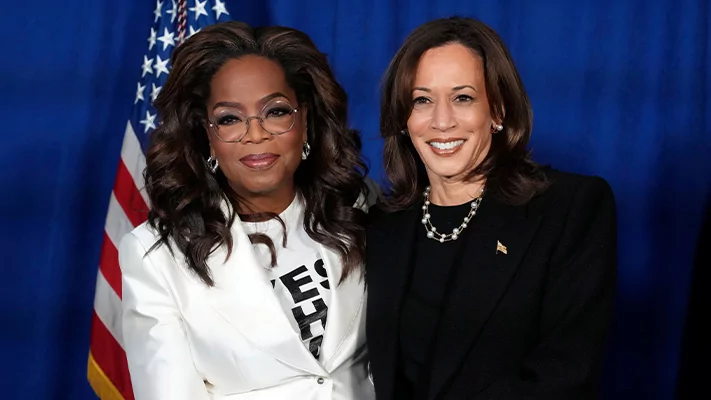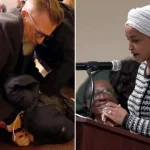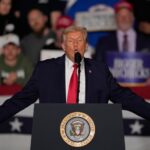
Celebrity A-listers from Hollywood to New York and back to Hollywood came out in their well-publicized legions to support Vice President Kamala Harris during her failed run for the White House. They sold every message from optimism and excitement to shame and threats for weeks, only to see Donald Trump earn his president-elect “Get Out of Jail Free” card and sign up for his second go at the Oath of Office come January.
That’s a failure of epic blockbuster proportions to use the movie business’s vernacular. With Trump winning the electoral count going away and the popular vote total as a Republican for the first time since 2004, the question faces more begging than a Los Angeles resident walking the streets of Skid Row: Why didn’t the celebrity endorsements help Harris? More alarmingly, were the plugs a factor in her loss?
A Nov. 25 Rasmussen Reports poll overwhelmingly suggested the pro-Harris celebrity endorsements and “get out the vote” messages fell on deaf ears. The national telephone and online survey found that 56% of likely U.S. voters decided endorsements by celebrities made no difference in their votes for president. An additional 19% said such endorsements didn’t make “much difference.” Pitted against that 75% of responders rejecting big-name cheerleading, only 11% said celebrity urgings made “a lot of difference” — though there’s nothing in the survey asking if that difference was positive or negative.
Celeb endorsements dwindling importance
Radio host John Phillips does his daily political show in the belly of the celebrity beast at KABC in Los Angeles. According to the CNN political commentator and a columnist for the Orange County Register, regardless of their political leanings, celebs just aren’t as special anymore.
“Celebrities are overexposed now,” Phillips said. “Years ago, when your favorite celebrity was going to be on The Tonight Show, you tuned in because it was special. We didn’t have Twitter or Instagram or the constant updates we have now. Once we got minute-to-minute access to these people, their preferences became a lot less special.”
Phillips recalled the last time he thought any sort of celebrity endorsement had a genuine effect on an election — citing Oprah Winfrey hyping former President Barack Obama over Hillary Clinton for the 2008 Democratic presidential nomination.
“That gave female voters the permission they needed to vote for Obama over Hillary and deny her becoming the first female president,” Phillips added.
It’s generally understood in the 21st-century media world that every endorser, from the biggest star to the lowest-rung social media influencer, is somehow compensated for their ringing recommendations. While Phillips thinks the public expects movie stars and singers already lean Democrat, making their political statements more routine and less noteworthy, he also wondered if voters question how much money is changing hands between candidate and superstar.
“We’re hearing about, in many cases, seven-figure deals for (celebrities) to appear at pro-Harris concerts,” Phillips said. “People worried about inflation and the price of gas don’t want to be told how to vote by millionaires who are also being paid to show up by the (Harris) campaign.”
Phillips was only half-joking when he said the only big-name endorsement that had any effect on the 2024 presidential campaign came from Hulk Hogan at the Republican National Convention in Milwaukee this past summer.
“(Hogan) came out with more excitement and energy than most of the Harris celebrities managed,” he said.
Not all is lost for The Glitterati
Leo Braudy, Ph. D., is a cultural commentator and professor emeritus of English and art history at the University of Southern California. He disagreed with Phillips somewhat, insisting that some consumers and voters still pay attention to celebrities.
“Some consider particular celebrities role models and follow their fashions and other preferences,” Braudy said. “Some are made aware of those preferences but then make their own decision about imitating them. Some pay no attention at all.”
Braudy thinks the underlying questions are why and when celebrities decided to make their tastes known.
“Historically, celebrities first lent their names and images to products, not political candidates or national issues,” he explained. “Up through the Cold War 1950s, it was also considered dangerous (to celebrity status) to be too open about such things. The Vietnam War resistance started to change that. By now, it’s open season, and, to a certain extent, social media influencers have taken up product endorsement, accompanied by a few B- and C-level celebrities.”

With the flood of omnipresent online attention, Phillips and Braudy highlighted, within targeted niche channels from streaming services to online news to social media, a question of whether just any celebrity can reach the overall audience a political candidate desires. More sophisticated targeting is necessary to match a celebrity to a cause or message.
“Some close correlation between issue and demographic target would be necessary in our more fragmented media and political world,” Braudy insisted. “What group can be expected to use what platform, subscribe to which channels, download which apps? This is a more crucial issue with the designation of which celebrity to approach for the targeting.”
While Phillips appeared certain the celebrity recommendations turned voters off Harris, Braudy wasn’t as sure.
“For the anti-celebrity, anti-Hollywood, anti-elite, or the ‘Don’t tell me what to do’ part of the electorate, it may have turned them off,” he added. “But, there have some been so many different reasonable explanations for why the vote went as it did, I find it hard to say any single factor was crucial.”
CLICK HERE TO READ MORE FROM THE WASHINGTON EXAMINER
Ramesh Ponnuru, the editor of National Review and a contributing columnist for the Washington Post, insisted Hollywood and music industry stars endorsing and hyping a Democratic candidate is now so expected that it no longer has much of an impact.
“At this point, celebrity endorsements for Democratic presidential candidates are so routine that their absence would have prompted negative comment,” Ponnuru said. “I don’t think these endorsements turned off voters, but every minute spent recruiting another pop star or actor would have been better spent getting right on girls’ sports or deporting violent, illegal immigrants.”
John Scott Lewinski, MFA, is a writer based in Milwaukee.







